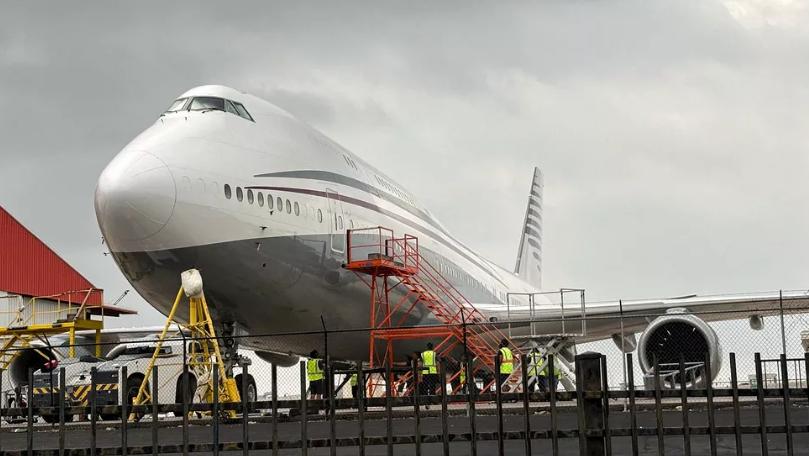Business
Volkswagen Finance Fined £5.4m by UK Regulator for Mistreating Borrowers
LONDON, UK — The UK’s Financial Conduct Authority (FCA) has fined Volkswagen Finance £5.4 million (€6.48 million) for mistreating borrowers over a six-year period between 2017 and 2023. In addition to the penalty, the financial arm of the German automaker will pay £21.5 million (€25.81 million) in compensation to approximately 110,000 affected customers.
The FCA, in a statement on Monday, highlighted significant failings in Volkswagen Finance’s treatment of borrowers facing financial difficulties. The regulator said the company had worsened the situations of vulnerable customers by failing to adequately consider their needs and offering insufficient support.
“Volkswagen Finance made tough personal situations worse by failing to consider what those in difficulty might need,” said FCA Executive Director Therese Chambers. She emphasized that the company had not shown appropriate care for those struggling with payments, contributing to further hardships for these borrowers.
The investigation revealed that in several cases, Volkswagen Finance repossessed vehicles from customers without exploring alternative options. The FCA noted that this practice left many individuals in precarious positions, particularly those who relied on their vehicles for work. “This risked people being put in a worse position, particularly if they relied on their car to travel to work,” the regulator explained.
Another concerning finding was the lack of empathy shown by Volkswagen Finance’s advisers during customer interactions. In some instances, FCA investigators noted that advisers were dismissive, laughed at customers’ mistakes, and failed to offer apologies when necessary.
In response to the FCA’s intervention, Volkswagen Finance has implemented significant improvements in customer service and communication practices. The company is said to have taken steps to address the regulator’s concerns and ensure that vulnerable customers receive better support moving forward.
The fine against Volkswagen Finance follows a trend of FCA actions aimed at holding financial institutions accountable for poor customer treatment. In recent years, the regulator has imposed similar penalties on major banks, including HSBC, Barclays, Lloyds, and TSB, for failing to provide adequate assistance to customers in financial distress.
Volkswagen Finance’s compliance with the FCA’s ruling is seen as part of broader efforts by the UK’s financial regulator to ensure that borrowers, particularly those facing hardship, are treated fairly and provided with appropriate support options. The company is expected to continue making reforms to enhance its customer care and avoid similar issues in the future.
Business
Boeing Lands Record $96 Billion Deal with Qatar Airways During Trump’s Middle East Trade Tour

Boeing shares soared to their highest level in over a year after the U.S. aerospace giant secured a landmark $96 billion agreement with Qatar Airways, marking the largest widebody aircraft order in the company’s history. The deal was unveiled during former President Donald Trump’s ongoing trade mission across the Gulf region.
The agreement was part of a broader $243.5 billion package of U.S.-Qatar deals announced by the White House during Trump’s visit to Doha. It includes the sale of 130 Boeing 787 Dreamliners and 30 777X aircraft, reinforcing Washington’s deepening commercial ties with Gulf states.
“This order represents a record for Boeing and a pivotal moment for American manufacturing,” the White House said in a statement. “These historic deals will fuel economic growth, support nearly 400,000 American jobs, and reaffirm our leadership in aerospace technology.”
Boeing’s stock rose 2% on Wednesday, hitting a 52-week high in response to the announcement. The company described the order as its largest-ever for widebody jets and the biggest single purchase by Qatar Airways to date.
Qatar Airways CEO Engr. Badr Mohammed Al-Meer called the agreement a strategic move beyond mere fleet expansion. “We are building strength to deliver unmatched customer experiences,” he said, adding that the new aircraft will help the airline enhance global connectivity with improved efficiency and comfort.
Boeing CEO Kelly Ortberg, who joined Trump on the Middle East tour, hailed the deal as a major milestone for the company, which has struggled in recent years due to safety and production setbacks, particularly with its 737 MAX line. The company had also faced headwinds from U.S.-China trade tensions, which saw Beijing halt orders for Boeing jets in April.
In a related development, Boeing also secured a $4.8 billion order for 737-8 MAX aircraft from Saudi leasing firm AviLease earlier this week, further boosting its commercial prospects in the region.
Trump’s visit to Qatar follows a $600 billion investment plan signed with Saudi Arabia earlier in the week and precedes a scheduled stop in the United Arab Emirates, where additional aviation deals are anticipated.
The Boeing-Qatar agreement is one of several high-profile announcements during the former president’s tour, which also saw the finalization of an $80 billion artificial intelligence investment partnership with Saudi Arabia. These deals have not only strengthened U.S. business interests in the region but also driven gains across tech and aerospace stocks.
As geopolitical and trade dynamics continue to shift, Boeing’s historic order underscores the Gulf’s growing importance in the global aviation and technology supply chains.
Business
China and Europe Drive Global EV Growth as U.S. Market Stalls Amid Policy Uncertainty

Global sales of electric and plug-in hybrid vehicles continued to surge in April, driven by strong performance in China and Europe, despite a slowdown in North America, according to new data released Wednesday by EV research firm Rho Motion.
Worldwide, electric vehicle (EV) sales reached 1.5 million units in April, a 29% increase compared to the same month in 2024. However, this figure marked a 12% decline from March, indicating a monthly dip in momentum. From January to April, EV sales totaled 5.6 million units — a 29% rise year-on-year.
Europe and China were the key drivers of growth. Sales in Europe jumped by 35% in April, with China close behind at 32%. Meanwhile, the rest of the world saw an even stronger April growth rate of 51%. In contrast, North American sales declined by 5.6% during the same period.
“Tariff negotiations are dominating headlines, but quietly, domestic manufacturers in China and the EU are growing market share,” said Charles Lester, Data Manager at Rho Motion. “The EU is the standout performer in 2025, as emissions targets have ignited a rapid industry transition to electric.”
From January to April, China posted a 35% increase in EV sales compared to the previous year. Europe followed with 25%, while North America saw more modest growth at just 5%.
Experts point to political developments as a key factor shaping the market’s trajectory. “EV adoption is accelerating — but politics, not technology, will decide who leads and who lags,” said Professor Christian Brand, a transport and energy expert at Oxford University.
In the U.S., uncertainty over the future of green tax incentives under President Trump’s administration is causing hesitation. Legislation under review would eliminate the current $7,500 federal tax credit for EV purchases by the end of 2026 and limit eligibility further. Tax breaks for commercial and second-hand EVs could also be scrapped.
Meanwhile, China is rolling out new consumer incentives to stimulate its slowing economy. Buyers trading in older vehicles for new EVs are now eligible for subsidies worth 20,000 yuan (€2,471), further boosting demand.
Trump’s 25% tariffs on imported vehicles and components have complicated matters for automakers with global supply chains. While recent executive orders offer some tariff relief, industry leaders remain concerned about profitability and dampened consumer sentiment.
Despite the policy divide, more than one in four cars sold globally this year is expected to be electric, according to the International Energy Agency.
“The shift to EVs is a gradual evolution, not a revolution,” said Brand. “It’s not just about switching engines — it’s about reshaping entire industries.”
Business
Microsoft Lays Off 6,000 Employees Amid Strategic Shift and AI Investment Drive

Microsoft has begun laying off approximately 6,000 employees, accounting for nearly 3% of its global workforce, in what is its largest round of job cuts in over two years. The company cited organizational restructuring as the reason behind the move, which comes despite strong quarterly earnings and ongoing investment in artificial intelligence (AI) infrastructure.
The layoffs began Tuesday and span various departments, teams, and global regions, though many of the affected roles are concentrated in Microsoft’s home state of Washington. The company notified state officials that 1,985 jobs would be cut at its Redmond headquarters, with most of those roles tied to software engineering and product management.
“This is a day with a lot of tears,” wrote Scott Hanselman, a Microsoft vice president, on LinkedIn, where several affected employees and company leaders shared news of the layoffs. “These are people with dreams and rent and I love them and I want them to be OK.”
The cuts affect units across the company, including the Xbox gaming division and LinkedIn, the professional networking platform owned by Microsoft. The company stated that the layoffs would impact workers at all levels but are particularly focused on reducing management layers to enhance organizational efficiency.
The move follows Microsoft’s earlier announcement in January of smaller, performance-based layoffs. This latest round is the largest since early 2023, when the company cut 10,000 positions in the wake of pandemic-era overhiring.
Microsoft Chief Financial Officer Amy Hood indicated during an April earnings call that while the company’s headcount had increased 2% year-over-year by March, it had slightly declined compared to the end of 2024. Hood emphasized the company’s aim to “increase agility by reducing layers with fewer managers.”
The restructuring comes as Microsoft intensifies its investment in AI technology, with an estimated $80 billion allocated for AI-related infrastructure, including data centers, in the current fiscal year. However, analysts suggest that while AI may influence how Microsoft operates, the layoffs are more reflective of strategic realignment than automation-driven job replacement.
“Big tech companies have trimmed their workforces as they rearrange their strategies and pull back from aggressive hiring during the early post-pandemic years,” said Daniel Zhao, an economist at Glassdoor.
With economic uncertainties looming and consumer spending patterns shifting, experts say Microsoft’s decision could also reflect a cautious approach to longer-term planning amid geopolitical and market fluctuations.
Laid-off employees in Washington have been informed their final day will be in July.
-

 Business12 months ago
Business12 months agoSaudi Arabia’s Model for Sustainable Aviation Practices
-

 Business12 months ago
Business12 months agoRecent Developments in Small Business Taxes
-

 Politics12 months ago
Politics12 months agoWho was Ebrahim Raisi and his status in Iranian Politics?
-

 Business10 months ago
Business10 months agoCarrectly: Revolutionizing Car Care in Chicago
-

 Business11 months ago
Business11 months agoSaudi Arabia: Foreign Direct Investment Rises by 5.6% in Q1
-

 Technology12 months ago
Technology12 months agoComparing Apple Vision Pro and Meta Quest 3
-

 Politics12 months ago
Politics12 months agoIndonesia and Malaysia Call for Israel’s Compliance with ICJ Ruling on Gaza Offensive
-

 Sports9 months ago
Sports9 months agoKeely Hodgkinson Wins Britain’s First Athletics Gold at Paris Olympics in 800m


























